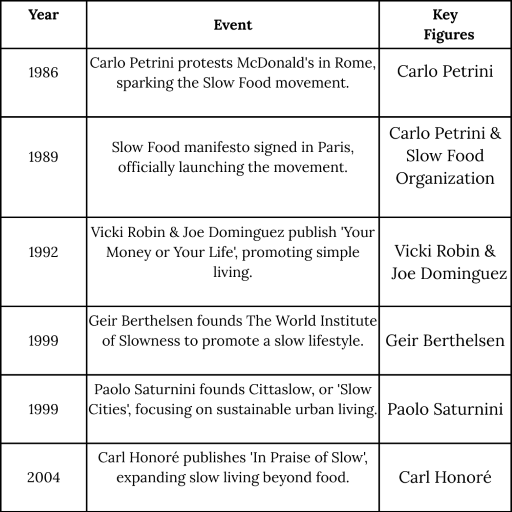What is Slow Living?
Slow living refers to living mindfully and with intention. It doesn’t mean idleness or doing nothing at all; rather, it means doing everything with proper attention and doing it slowly so that you can connect and feel with that emotion.
Often, I see people bragging about multitasking on social media. Doing multiple things at once ultimately leads to burnout. Bingeing Netflix while eating—we all do that, right? Neither do we enjoy the Netflix show nor the meal.
That’s one case. We are always running late, always fighting for something. In the morning, we don’t even have breakfast properly because we’re running late for work; at night, we don’t sleep properly because of pending work.
The “hustle culture” has more drawbacks than progress. In productivity content, phrases like “set a goal,” “follow this routine every day,” and all of these make sense. But have you ever thought that sometimes these things just make you more anxious than motivated? When this content or news appears in front of me, I feel this weird twist in my gut and wonder, Am I even moving forward? Is this even possible for me to achieve at this pace? How much do I have to push forward to reach there?
In life, we need to work hard to reach a sense of success that we define for ourselves. But you need to remember that it’s necessary to let yourself breathe and slow down. Remember that every person should live at their own pace. Just because someone is running toward something and feeling happy doesn’t mean it’s the same for you.
I have realized that burnout and losing yourself in the fast-paced society are so real that you will eventually lose yourself in the process.
History of Slow Living
In 1986, McDonald’s planned to open a branch near the Spanish Steps in Rome, which sparked protests. Carlo Petrini, an Italian journalist and activist, and his group opposed the industrialization of food and the loss of traditional culinary practices. From that, the Slow Food Movement was introduced.
SLOW represents:
- S for Sustainable
- L for Local
- O for Organic
- W for Wholesome
His movement promotes local, sustainable, and traditional food production over fast food culture.
In 1999, Geir Berthelsen expanded the concept of slow living beyond food and founded the World Institute of Slowness.
A Canadian journalist named Carl Honoré is known as the global ambassador of slow living. His backstory of entering into the concept is widely famous and encouraging. He realized the vicious cycle when he found himself rushing through bedtime stories for his young son. When the competition for speed in modern life affected his emotional space, that was the moment he realized that he needed to wake up from this.
The concept is widely appreciated and promoted through various mediums—TED talks, books, podcasts, and movements.
Books
- In Praise of Slow by Carl Honoré (2004) [Foundation of slow movement]
- The Things You Can See Only When You Slow Down by Haemin Sunim (2012) [I’ve read this book. You will feel peaceful and calm while reading this.]
- The Kinfolk Home by Nathan Williams
- Slow: Simple Living for a Frantic World by Brooke McAlary (2017)
- Destination Simple: Everyday Rituals for a Slower Life by Brooke McAlary (2018)
TED Talks
- In Praise of Slowness by Carl Honoré
- Why You Should Take Time to Slow Down – Eduardo Briceño (2017)
- Forget Multitasking, Try Monotasking – Paolo Cardini (2012)
Podcasts
- The Slow Home Podcast – Brooke McAlary
- The Minimalists Podcast – Joshua Fields Millburn & Ryan Nicodemus
- The Mindful Kind – Rachael Kable
- The Simple Sophisticate – Shannon Ables
Influences of Eastern Philosophy on Slow Living
In Eastern philosophy, wellness has great significance. Living with peace, minimalism, mindfulness, and natural flow are all engraved in their culture and thoughts. That’s why the concept of slow living is effectively influenced by Eastern philosophy.
Taoism (Daoism)
Tao means the universe.
An ancient Chinese philosophy founded by Laozi teaches that life should be in harmony with the natural flow. This means that you should let your life flow naturally rather than forcing things all the time.
The principle of Wu Wei means acting without force. Instead of working constantly, we should pause, reflect, and work in rhythm with nature.
A quote from the Tao Te Ching:
“Nature does not hurry, yet everything is accomplished.”
Buddhism
Founded by Siddhartha Gautama (the Buddha), Buddhism teaches that suffering comes from attachment and rushing through life. Being fully mindful in the present moment—whether it’s eating, working, or resting—teaches humans to be content with simplicity.
Buddhism is based on mindfulness, minimalism, and meditation. All of these are methods of slow living.
A quote from Thich Nhat Hanh:
“When you walk, walk. When you eat, eat.”
Confucianism
Confucius, the great Chinese philosopher, emphasized the importance of rituals and relationships, meaning living with intention and enrichment. In slow living, tea ceremonies, handwritten letters, cooking with love, and valuing community and relationships over a fast-paced modern world are influenced by Confucianism.
A quote from Confucius:
“It does not matter how slowly you go as long as you do not stop.”
Ikigai
Finding purpose and balance in life is Ikigai, a Japanese concept of a happier life. Slow living also serves the same purpose. The concept ensures that people don’t lose their life’s purpose—happiness—while running after success.
Hygge
It’s a Danish concept of coziness, comfort, and well-being—enjoying simple pleasures, creating a warm atmosphere, and fostering deep connections with loved ones. Slow living supports the same. Denmark consistently ranks among the happiest countries in the world— isn’t that inspiring?
How Do We Adapt to Slow Living?
We are habituated to multitasking, keeping ourselves busy all the time. With the progression of the world, adapting to slow living can be difficult. While everyone around you is pacing fast, you might feel anxious about not being able to keep up with them. But this is for your own well-being so that you don’t get lost in the maze.
Some tips and tricks to slowly adapt to a peaceful living can be:
Decluttering is necessary
No matter how big my house gets, there’s never enough space. It’s cluttered with things I might never use, but while cleaning, it feels like someday they might be needed.
Decluttering is the first step toward a life where only absolutely useful things get to stay. Making space in a home doesn’t only mean literally; psychologically, it helps us prioritize what truly matters in life.
Minimalism is not a modern way of living but a relaxing way. Slowly, make a habit of adapting to simplicity in your home and lifestyle. This habit helps in making effective decisions, reduces the stress of what to do among so many choices, and gives a sense of calm.
Reduce multitasking and focus on the present
When I eat and watch something, I eat faster. That’s not a healthy way because it affects my appetite. Also, most of the time, I don’t notice how much and what I am eating. That’s my case—I am sure you have similar cases as well.
Take one step at a time and limit your multitasking. Consciously focusing on one task helps in doing it with intention and precision. We all know about communication etiquette. Multitasking wires the brain in such a way that you can’t focus on one thing at a time. So, when someone is talking to you, you can’t fully focus and listen because, in the back of your mind, you are thinking about something else.
Monotasking keeps you focused on the present and increases enjoyment in whatever the work is.
Spend time in nature
Outdoor activities, simple walks, roaming around, and taking vacations from time to time save life from burnout. It maintains a balance between work and life. Life is never stress-free; it’s necessary to take time to process and then move forward.
Only 10 minutes of walking in nature has magical results on mental well-being. Focusing on physical well-being is common, but this is a vitamin for the mind.
Consume consciously
Shopping sprees are a common phenomenon among women. There’s a gender distinction in choices—while women are seen as impulse shoppers, men tend to lean toward gadgets and tech. This is not about choices; it’s about impulse consumption.
The consequences are vital. What happens then? Waste clutters, and appreciation and gratitude reduced. The more we get, the more we forget to appreciate small pleasures. The amount of happiness we used to feel in childhood playing a simple snake game—do we feel the same with everything we have?
Reduce your impulse consumption, be it food, clothes, or anything else. You will feel happiness from minor moments.
The Conclusion
The conclusion is “Things you see only when you slow down.”
Don’t forget the goal of life—to be in peace. With that motto in mind, organize everything else around you.
More importantly, Live, Reflect, and Move forward.




